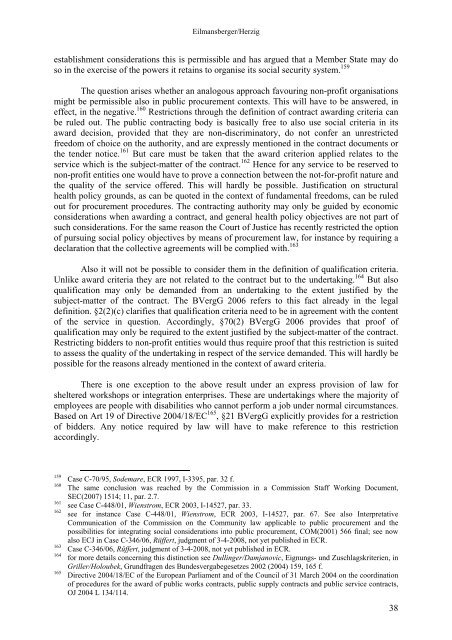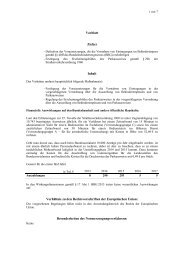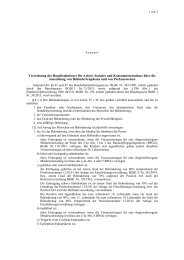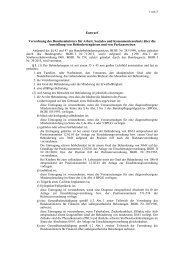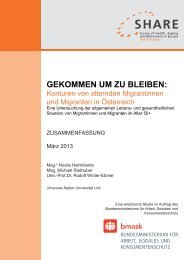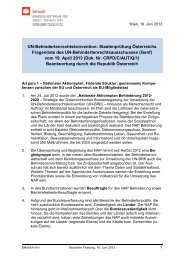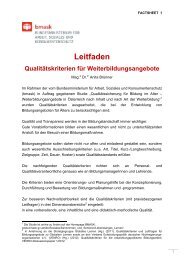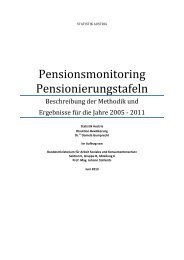Social Services of General Interest (SSGI)
Social Services of General Interest (SSGI)
Social Services of General Interest (SSGI)
You also want an ePaper? Increase the reach of your titles
YUMPU automatically turns print PDFs into web optimized ePapers that Google loves.
Eilmansberger/Herzig<br />
establishment considerations this is permissible and has argued that a Member State may do<br />
so in the exercise <strong>of</strong> the powers it retains to organise its social security system. 159<br />
The question arises whether an analogous approach favouring non-pr<strong>of</strong>it organisations<br />
might be permissible also in public procurement contexts. This will have to be answered, in<br />
effect, in the negative. 160 Restrictions through the definition <strong>of</strong> contract awarding criteria can<br />
be ruled out. The public contracting body is basically free to also use social criteria in its<br />
award decision, provided that they are non-discriminatory, do not confer an unrestricted<br />
freedom <strong>of</strong> choice on the authority, and are expressly mentioned in the contract documents or<br />
the tender notice. 161 But care must be taken that the award criterion applied relates to the<br />
service which is the subject-matter <strong>of</strong> the contract. 162 Hence for any service to be reserved to<br />
non-pr<strong>of</strong>it entities one would have to prove a connection between the not-for-pr<strong>of</strong>it nature and<br />
the quality <strong>of</strong> the service <strong>of</strong>fered. This will hardly be possible. Justification on structural<br />
health policy grounds, as can be quoted in the context <strong>of</strong> fundamental freedoms, can be ruled<br />
out for procurement procedures. The contracting authority may only be guided by economic<br />
considerations when awarding a contract, and general health policy objectives are not part <strong>of</strong><br />
such considerations. For the same reason the Court <strong>of</strong> Justice has recently restricted the option<br />
<strong>of</strong> pursuing social policy objectives by means <strong>of</strong> procurement law, for instance by requiring a<br />
declaration that the collective agreements will be complied with. 163<br />
Also it will not be possible to consider them in the definition <strong>of</strong> qualification criteria.<br />
Unlike award criteria they are not related to the contract but to the undertaking. 164 But also<br />
qualification may only be demanded from an undertaking to the extent justified by the<br />
subject-matter <strong>of</strong> the contract. The BVergG 2006 refers to this fact already in the legal<br />
definition. §2(2)(c) clarifies that qualification criteria need to be in agreement with the content<br />
<strong>of</strong> the service in question. Accordingly, §70(2) BVergG 2006 provides that pro<strong>of</strong> <strong>of</strong><br />
qualification may only be required to the extent justified by the subject-matter <strong>of</strong> the contract.<br />
Restricting bidders to non-pr<strong>of</strong>it entities would thus require pro<strong>of</strong> that this restriction is suited<br />
to assess the quality <strong>of</strong> the undertaking in respect <strong>of</strong> the service demanded. This will hardly be<br />
possible for the reasons already mentioned in the context <strong>of</strong> award criteria.<br />
There is one exception to the above result under an express provision <strong>of</strong> law for<br />
sheltered workshops or integration enterprises. These are undertakings where the majority <strong>of</strong><br />
employees are people with disabilities who cannot perform a job under normal circumstances.<br />
Based on Art 19 <strong>of</strong> Directive 2004/18/EC 165 , §21 BVergG explicitly provides for a restriction<br />
<strong>of</strong> bidders. Any notice required by law will have to make reference to this restriction<br />
accordingly.<br />
159<br />
Case C-70/95, Sodemare, ECR 1997, I-3395, par. 32 f.<br />
160<br />
The same conclusion was reached by the Commission in a Commission Staff Working Document,<br />
SEC(2007) 1514; 11, par. 2.7.<br />
161<br />
see Case C-448/01, Wienstrom, ECR 2003, I-14527, par. 33.<br />
162<br />
see for instance Case C-448/01, Wienstrom, ECR 2003, I-14527, par. 67. See also Interpretative<br />
Communication <strong>of</strong> the Commission on the Community law applicable to public procurement and the<br />
possibilities for integrating social considerations into public procurement, COM(2001) 566 final; see now<br />
also ECJ in Case C-346/06, Rüffert, judgment <strong>of</strong> 3-4-2008, not yet published in ECR.<br />
163<br />
Case C-346/06, Rüffert, judgment <strong>of</strong> 3-4-2008, not yet published in ECR.<br />
164<br />
for more details concerning this distinction see Dullinger/Damjanovic, Eignungs- und Zuschlagskriterien, in<br />
Griller/Holoubek, Grundfragen des Bundesvergabegesetzes 2002 (2004) 159, 165 f.<br />
165<br />
Directive 2004/18/EC <strong>of</strong> the European Parliament and <strong>of</strong> the Council <strong>of</strong> 31 March 2004 on the coordination<br />
<strong>of</strong> procedures for the award <strong>of</strong> public works contracts, public supply contracts and public service contracts,<br />
OJ 2004 L 134/114.<br />
38


